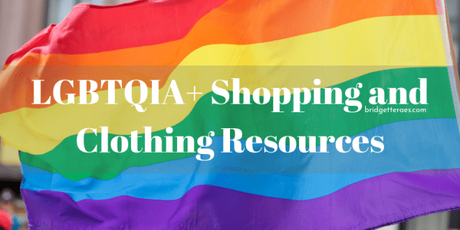
The first time I met a transgender woman I was 18 years old. I was working in a small boutique in a New Jersey mall during my senior year of high school. It was late in the evening and the store was near closing, but not at the point that we weren’t letting people into the dressing rooms. The only two people left working were me and my manager. My manager spotted a transgender woman looking through the racks and told me that under no circumstances would we let her (although I’m pretty sure, given my manager’s bigotry, she didn’t use the proper pronoun) try on any clothes.
As the woman continued to look through the racks, she asked to try things on. My manager used the excuse that we were closing soon and it wouldn’t be possible. But this transgender woman had clearly been in this position before. I could tell by her eyes, eyes I will never forget. She looked at us not with rage from the clear bigotry she was experiencing, but with an apologetic and exhausted pleasant smile that showed me just how tired she was of trying to make her way in the world.
Despite the fact that I can recall that memory so vividly, I hadn’t thought about it until I started working on this post and could reflect on how far we have come since my experience in 1992. This is certainly not to say that we still don’t have a long way to go.
I don’t remember a time in my life I wasn’t accepting of the LBGTQIA+ community. It just never made sense to me that someone cared enough to get in a lather over who another person loved. And I get it, I don’t live under a rock. I understand that much of this bigotry has been motivated by religious views. So understand, I’m not trying to deny an individual their right to believe that gay rights aren’t human rights; that would be equally bigoted of me to say that a person can’t think differently than me. But I do take issue with the intolerance and efforts made to take the freedoms that these people enjoy away from the gay community.
LGBTQIA+ Shopping and Clothing Resources
On this blog, like in my life, I pride myself on celebrating inclusivity. I have done posts on style for women who dress for more religious conservative observances, men who wear pantyhose, have shared resources on adaptive clothing, and more. Being Pride Month, I am gathering together clothing and shopping resources for the LGBTQIA+ community.
Being a hetero cis woman, I know that I am likely just scratching the surface here and I worked especially hard to use proper language and respect (please tell me if I missed the mark with my wording.) Working on this post, I learned along the way and welcome all comments, recommendations and feedback in the comments.
Kirrin Finch
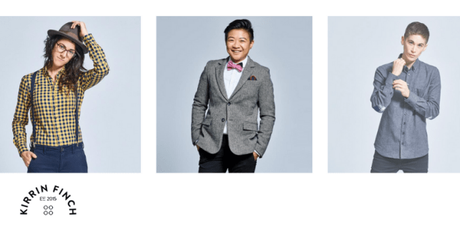
Kirrin Finch is a conscientious clothing company founded by Brooklyn-based couple Laura Moffat and Kelly Sanders Moffat, that meets the growing demand for gender-defying fashion by creating menswear-inspired apparel designed to fit a range of female and non-binary bodies. All the clothes are made in the U.S.A., they have environmentally sustainable practices and gives back to the LGBT community.
The name, Kirrin Finch, was inspired by iconic fictional tomboys “Georgina Kirrin” from The Famous Five series and “Scout Finch” from To Kill A Mockingbird. Both these characters embrace the tomboy spirit and are not constrained by society’s views of how a woman should behave or dress. Each shirt takes on the name of a tomboy character.
Wildfang
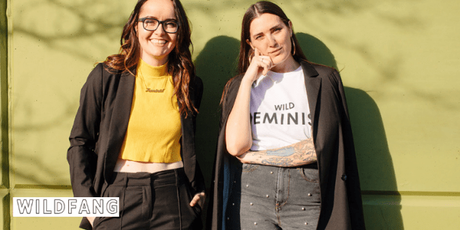
In 2013, Wildfang set out to create a home for badass womxn everywhere. It started with the “radical” belief that a womxn has the right to wear whatever the hell she wants and be whoever the hell she wants. And speaking of rights, in 2018 alone, they raised over $400k for charities that support reproductive, immigrant, and women’s/human rights.
dfrntpigeon
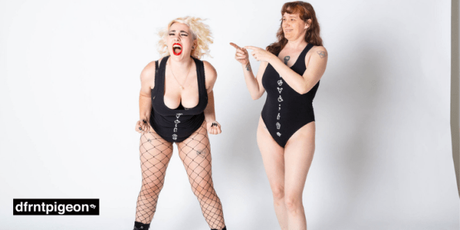
Dfrntpigeon is a social enterprise apparel + lifestyle brand run by Portland’s marginalized and at-risk youth. They connect its young participants with mentorship, resources, and opportunities to express themselves — along with producing some of Portland’s coolest locally-designed products. The art they make is inspired by their unique experiences and perspectives on the world. Their business model helps at-risk youth develop their creative abilities into a potential career path through paid design work and mentorship from professionals in the creative field.
Stuzo Clothing
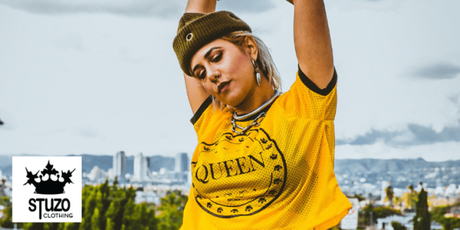
Stuzo Clothing started in 2010 by Stoney Michelli & Uzo Ejikeme. Based in Los Angeles, their mission is to create a space in the fashion world where all are welcome without judgment. Stuzo Clothing offers gender-free clothing for the non-conforming and bold at heart. Their pieces are unisex or gender-free. They prefer gender-free because, as they said, clothes don’t have any organs last time they checked<ha!!>. Whatever shape or form you choose to exist in, they celebrate that!
Celebrities such as Ruby Rose (Orange is the New Black), comedians Gina Yashere (Conan O’Brien, Def Comedy Jam) & Tiffany Haddish (Girls Trip), Coco & Breezy, Lena Waithe (Master of None), Jada Pinkett Smith, and Spike Lee are some of the many that’s been known to be customers.
Equal Period
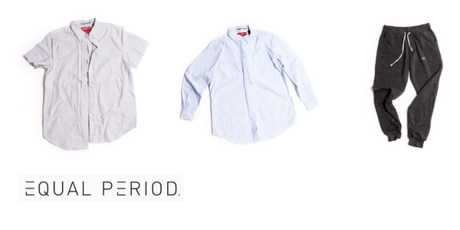
Equal Period is an organization empowering the LGBTQ community by creating clothing for a more diverse group of body types and identities. They hope to start a conversation about gender, sexuality, orientation and its role in fashion. They want to push the boundaries of Masculine-Male and Feminine-Female that exist in fashion now and instead provide more inclusive clothing options. Equal Period vows to make positive change not pocket change. Their prices are affordable, the donation amount standard, and the revenue stream pretty much breakeven.
$10 from every item sold goes back to an established LGBT nonprofits.
Autostraddle
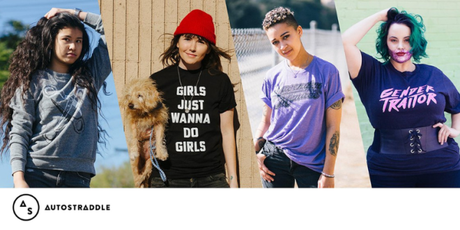
Founded in March 2009 by Riese Bernard and Alexandra Vega and still run by a dedicated team of passionate weirdos (they said it, not me), Autostraddle is an intelligent, hilarious & provocative voice and a progressively feminist online community for multiple generations of kickass lesbian, bisexual & otherwise inclined ladies (and their friends). You can visit their independently owned, award-winning, online magazine and social network here, and also shop for clothing in their Autostraddle store on Hello, Merch.
Peau de Loup
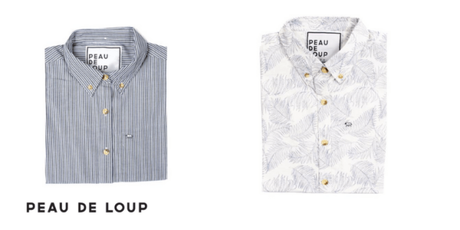
Peau de Loup believes in doing one thing incredibly well. They have kept it simple: specializing in well-made button-downs for bodies with curves. They are a brand that stands for something. Looking at their website, it looks like they have expanded to other things like underwear, shoes, and more.
Peau de Loup we made it their mission to leave as little a footprint as possible and found a way to reduce waste while making a high-quality garment, fit and affordable for everyone. They up-cycle and source only the best available fabrics – limited-edition, one-time-only roll ends of fabric left over from other companies’ production. Because they are not producing new fabrics, the shirts are close to zero-waste: unlike big, fast-fashion retailers, PDL doesn’t add any harmful dyes or chemicals into the environment, and at the same time they keep these unique cottons out of the landfill. Their manufacturers pay their workers a living wage, and together they create an ethical and eco-friendly product.
NiK Kacy
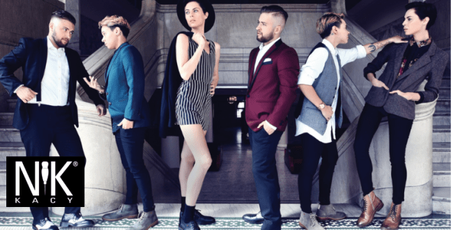
iK Kacy is a fashion line inspired by the fashion needs of both its founder and the larger LGBTQ community. NiK Kacy, who identifies as gender-fluid, queer and transmasculine, designed their first collection of “masculine of center” gender-neutral shoes in order to provide a solution for the on-going problem of individuals unable to purchase men’s styled shoes due to limitations in sizing set by the shoe industry based on gender. Their first collection, named “Fortune”, consists of 5 classically masculine looking styles, now modernized with colorful contrasts and re-proportioned to fit those who identify in whatever spirit they deem fit.
NiK’s desire for gender equality extends further by expanding their label to include an upcoming “feminine of center” collection, featuring high-heel styled shoes in the same European unisex sizes ranging from 34-47 (US women’s 3.5 to men’s 14), as well as, a unisex accessories line.
Sharpe Suiting
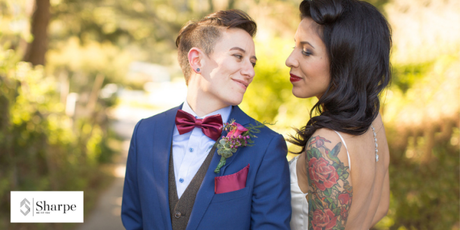
Sharpe Suiting, an LA-based company, creates gender-neutral ready-to-wear clothing and custom suits and dresses for all body types and all identities. Using Andropometrics, a trademarked system for measuring a person based on their gender identity, Sharpe Suiting creates suits with the exact fit, shape or silhouette his customers desire by “straightening unwanted, or adding wanted, angles and curves.”
Leon Wu, founder and CEO of Sharpe Suiting, doesn’t discriminate against customers who don’t fit those descriptions, either. As he has been quoted, “When gay men, queens, femmes and fashion-forward straight men showed up wanting high-quality clothing that expressed their identities, who were we to say they didn’t fit within our scope? Fashion often is based on a concept of exclusivity. We want to change that by being a company that is always inclusive.”
Chromat
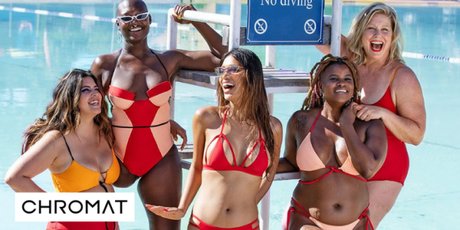
Chromat was formed by Becca McCharen-Tran in 2010. Drawing from Becca McCharen-Tran’s background in architecture and urban design, Chromat focuses on empowering garments for all bodies and is committed to empowering #ChromatBABES of all shapes and sizes through perfectly fit garments for every body. They hope that everytime you wear Chromat, it reinforces the message that there are many different versions of beautiful and that every body is worthy of love, acceptance and empowering swimwear.
TomboyX
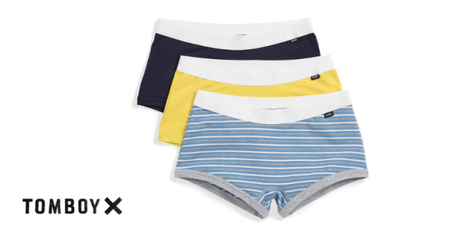
TomboyX was founded to create underwear that fit regular bodies and any body could feel comfortable in, regardless of where they fell on the size or gender spectrum. As TomboyX says, “it’s not a feminist agenda. It’s not a gay agenda. It’s all of those things. It’s a human agenda. An agenda that says: We are all people.” Tomboy X offers underwear, bras and swim.
Rebirth Garments
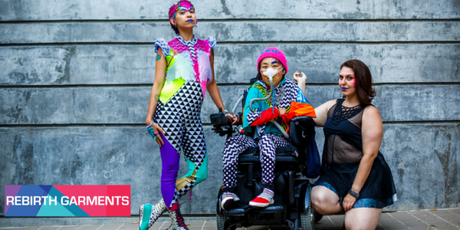
Rebirth Garment’s mission is to create gender non-conforming wearables and accessories for people on the full spectrum of gender, size and ability. The line creates a community where all people can confidently express their individuality and identity. Their identity is that of Queer and Disabled, which encompasses queer, gender nonconforming identities and apparent/ non-apparent disabilities/ disorders—physical, mental, psychological, intellectual, developmental, emotional, etc. In particular, our trans and disabled communities have very particular clothing needs that are not adequately served by mainstream clothing designers. Instead of being centered on cisgender, heterosexual, white, thin people, Rebirth Garments is centered on Queer and Disabled people.
Rebirth Garments challenges mainstream beauty standards that are sizest, ableist, and conform to the gender binary. Instead, they maintain the notion of Radical Visibility, a movement based on claiming our bodies and, through the use of bright colors, exuberant fabrics, and innovative designs, highlighting the parts of us that society typically shuns. Through Radical Visibility, they refuse to assimilate and can create a QueerCrip dress reform movement.
Origami Customs
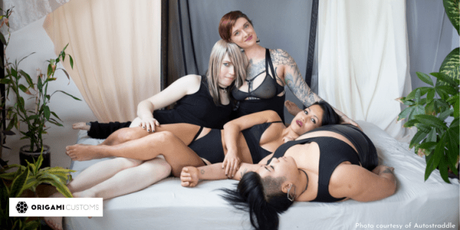
Origami Customs is a customized and handmade line of swimwear, lingerie, and more for folks of all genders. They offer people of any size, shape, age, ability and gender expression a safe way to have customized items that meet their needs. Each item is custom patterned for a perfect fit. Origami Customs is an ethical, values-based company, using sustainable fabrics and manufacturing. Everything is made onsite in their space in Montreal.
Although the line is for “all bodies”, Origami Customs specializes in making gender- affirming products for folks of diverse genders. As a Non-Binary Queer Femme with a Transmasculine partner, the founder cares deeply about the needs of the community offers completely customizable items for people across the gender spectrum.
Penny Loves Kenny
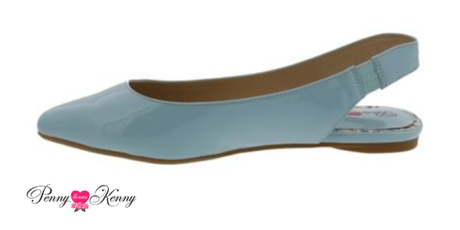
One of the hardest obstacles for transgender women is finding shoes. There are some sites, but have you looked at some of them? Nothing against drag queens (AT ALL), but not every trans woman wants to look like she is dressing for the club. Where can a trans woman find decent shoes to attend her granddaughter’s baptism, go to brunch with friends or run to the grocery store? Penny Loves Kenny is a popular shoe resource for trans women looking for fresh designs and affordable footwear. Many styles go up to a size 14 and word is that they will be offering size 15 soon.
A solution for the harsh financial reality of living as a trans individual
Being marginalized is the often ignored part of being trans. More than 15 percent of the transgender population reports less than $10,000 yearly income, according to a 2015 Movement Advancement Project report. Add in the cost of hormone treatments, surgeries, and more, and it doesn’t matter how many inclusive clothing lines spring up if the community itself can’t afford it. You can read an article by my friend Parrish Turner on the true reality of earning a living and budgeting for surgeries and making it on his own as a trans person here. As Turner says in his article, “generally, the unemployment rate in the United States is around 9%, but for transgender people, it is more like 16%. And 1 in 5 will experience homelessness at some point in their lifetime. Debt is endemic to my generation and the costs of transition can quickly sink a person deeper into the pit.”
To make matters worse, according to Daye Pope, a transgender community organizer in Washington, D.C., inaccessibility to appropriate clothing presents a major employment hurdle for transgender people: Trans people not only often lack experience in choosing professional attire for their true gender, but the resources to obtain such attire. This absence of readily available work clothes feeds into a cycle of poverty, putting already-poor people at a disadvantage during the application process,” according to his statement in an article in the Pacific Standard.
Clothing Swaps and TransClosets
This is what makes trans clothing swaps and TransClosets so promising. Often organized by communities, and you can also find these types of closets and swaps on Meetup and a Transgender Clothing Exchange on Tumblr, I was also encouraged to read that many colleges are opening TransClosets on campuses around the country. Not only do trans individuals get access to clothing they might not be able to afford to help propel their lives forward, but they will also be able to find community and support at the same time.
Transcend Charlotte
Starting this month, I have decided that 1/2 of what my closed Facebook Group community earns through a small monthly subscription membership fee will go towards fashion-related organizations and causes doing good in the world. Each month, I will be selecting a different one in areas like sustainability, inclusivity, human rights, and more.
Being Pride Month, I selected Transcend Charlotte as the organization where I will be sending June’s group’s donation. Transcend Charlotte promotes authenticity, connection, and social justice by empowering transgender individuals and all gender diverse or gender non-conforming people impacted by oppression and/or trauma. They believe in person-centered rather than identity-centered language and do not discriminate based on sex, gender, gender identity, gender expression, sexual orientation, race, color, religion, age, ability, mental illness/injury, or beliefs. In addition to this, Trancend Charlotte has a service called TransCloset, a free clothing service available for trans-identified individuals and anyone struggling with issues related to gender expression in the Charlotte area. They offer a safe space– no gendered fitting rooms– to explore a variety of clothing options, allowing a trans individual to discover their own unique style in a stress-free environment.
Lastly, I want to say this: To the woman who tried to shop at that store in 1992 and got turned away, I am sorry. I am sorry I didn’t say anything or stand up for your rights as another human. I am sorry that another piece of your dignity was chipped that day and that, even in a small way, I was complicit in it. It is my hope that since then, you have found peace and respect. Never again will I allow the rights and dignity of another person in this world to be crushed.

